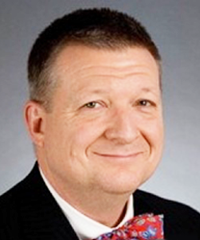During his time as a neurosurgeon in Uganda, Benjamin Warf, MD was the first to identify neonatal infection as the most common cause of hydrocephalus in East Africa. He uncovered a correlation between the rainfall cycle and these infections. Warf pioneered and tested an alternative to shunts for this population, combining endoscopic third ventriculostomy and choroid plexus cauterization (ETV/CPC). Much of my research has focused on outcomes for this surgery.
His work was the first to demonstrate equivalence in early childhood development between ETV/CPC and shunt treatment and the first to show the effect of previous ETV or CPC on subsequent shunt function. His research analyzed the disease burden and economic impact for infant hydrocephalus in sub-Saharan Africa, and provided a detailed cost-benefit analysis of its treatment—among the first studies to demonstrate cost-effectiveness for any surgical procedure in a setting with limited resources.
Clinical outcomes have been an important part of Dr. Wharf's research. He documented the 5-year survival rates and functional outcomes for Ugandan infants treated for myelomeningocele and for post-infectious-hydrocephalus. He also reported equivalent outcomes between an inexpensive Indian shunt and an American shunt costing 20 times more.
In 2012, he was awarded a grant from the NIH to carry out a prospective randomized trial of developmental and brain volume outcomes for shunt placement versus ETV/CPC in Ugandan infants with post-infectious hydrocephalus. This work has now received additional NIH funding for its completion and extension through a grant that began in August 2015.
By invitation, Dr. Warf, has presented work at the CDC as well as the NIH. He has testified before the House Subcommittee on Africa, Global Health, and Human Rights, which resulted in the introduction of the International Hydrocephalus Treatment and Training Act (HR 3525) into the House of Representatives, and the subsequent introduction of HR 1468, the “Global Brain Health Act of 2015”.
Benjamin Warf, MD research, teaching, and leadership in both Africa and North America continue to inform and benefit one another with the ultimate goal of improving access to optimal, evidence-based, and sustainable treatment for children with hydrocephalus and spina bifida everywhere.
My research efforts have focused primarily on hydrocephalus in the developing world and in the United States, defining, validating, and reproducing a novel, low-cost method for treating this condition.Program in Global Surgery and Social Change
J Neurosurg Pediatr
View full abstract on Pubmed
Prenat Diagn
View full abstract on Pubmed
Childs Nerv Syst
View full abstract on Pubmed
J Neurosurg Case Lessons
View full abstract on Pubmed
Epigenetics
View full abstract on Pubmed
Environ Res
View full abstract on Pubmed
J Neurosurg Pediatr
View full abstract on Pubmed
World Neurosurg
View full abstract on Pubmed
Environ Health
View full abstract on Pubmed
BMC Pediatr
View full abstract on Pubmed
